Reflection on Value-Based Care: Individuals with Specific Needs
VerifiedAdded on 2023/01/05
|7
|1491
|95
Report
AI Summary
This report reflects on the application of value-based care in supporting individuals with specific needs, particularly those with mental and physical disabilities. It examines the development and implementation of a care plan designed to address the patient's specific needs, including interventions for depression, alcohol consumption, and sleep issues. The report critically analyzes how stereotypes negatively impacted the care process, affecting the patient's self-esteem, motivation, and decision-making, and influencing the patient's perception of the provider. It discusses the strategies employed to mitigate the impact of stereotypes, such as educating the patient and fostering diversity within the practice. The report concludes by highlighting the importance of an inclusive organizational culture and leadership development in delivering effective care and achieving positive patient outcomes, emphasizing the need for awareness of the impact of stereotypes on healthcare decisions.
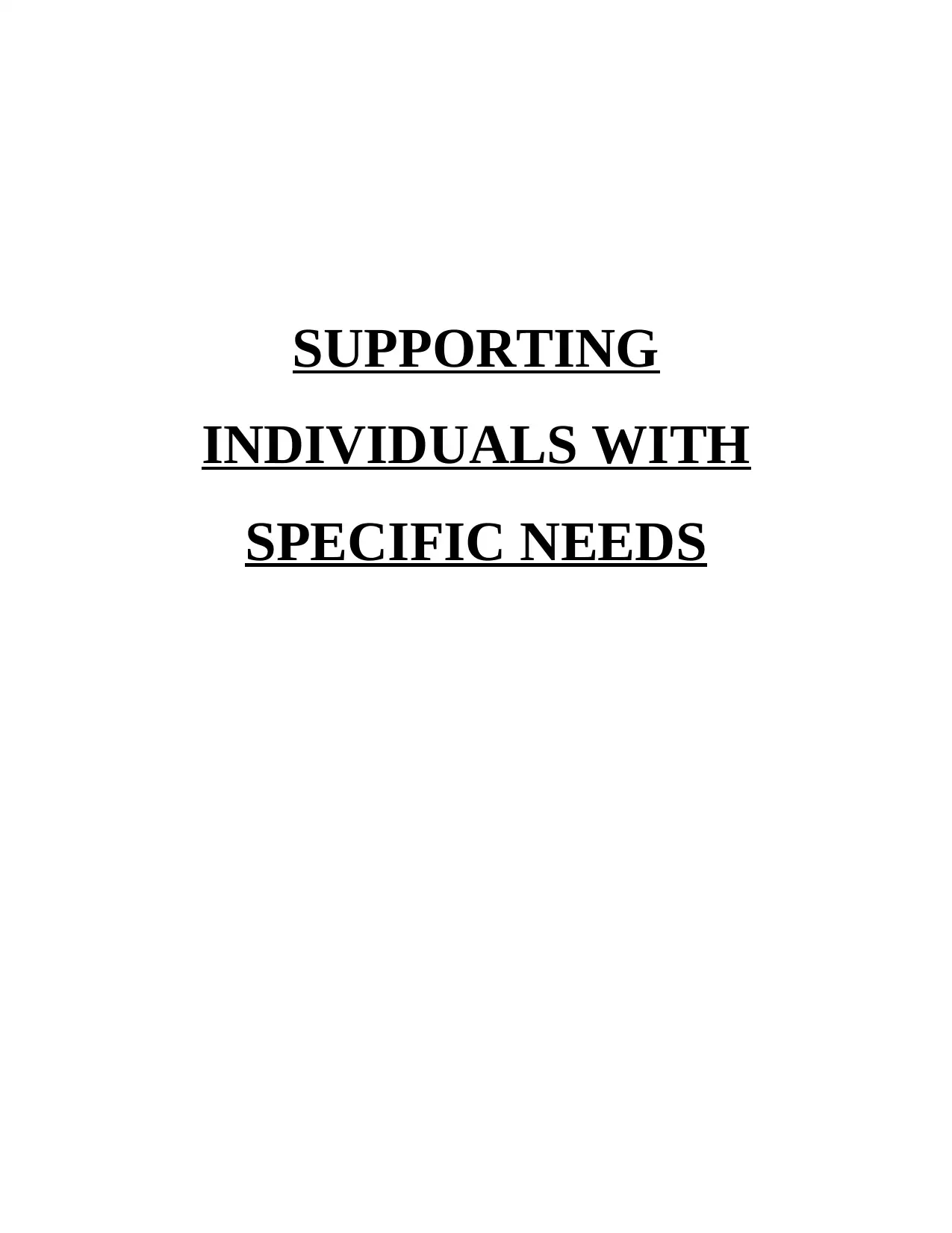
SUPPORTING
INDIVIDUALS WITH
SPECIFIC NEEDS
INDIVIDUALS WITH
SPECIFIC NEEDS
Paraphrase This Document
Need a fresh take? Get an instant paraphrase of this document with our AI Paraphraser
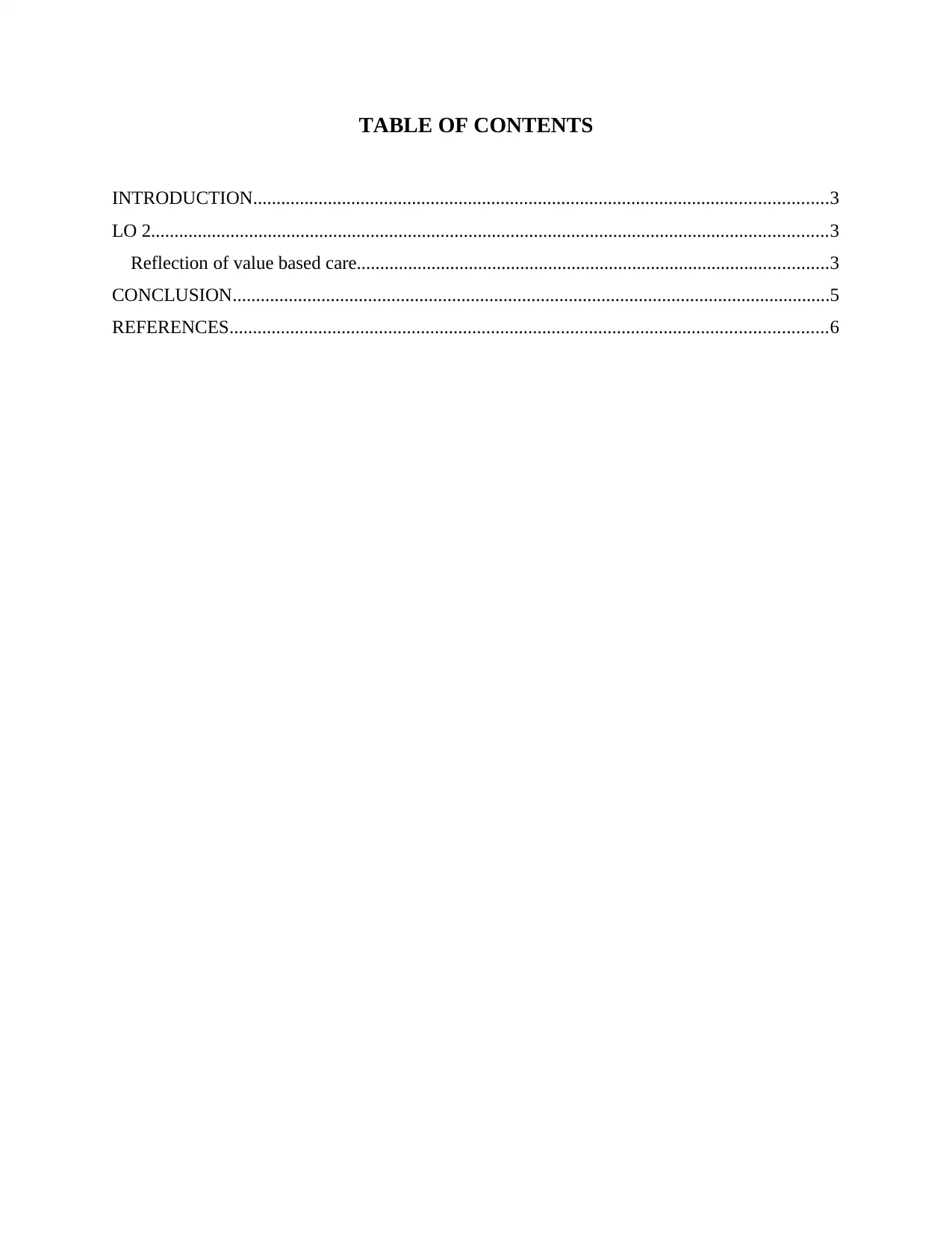
TABLE OF CONTENTS
INTRODUCTION...........................................................................................................................3
LO 2.................................................................................................................................................3
Reflection of value based care.....................................................................................................3
CONCLUSION................................................................................................................................5
REFERENCES................................................................................................................................6
INTRODUCTION...........................................................................................................................3
LO 2.................................................................................................................................................3
Reflection of value based care.....................................................................................................3
CONCLUSION................................................................................................................................5
REFERENCES................................................................................................................................6
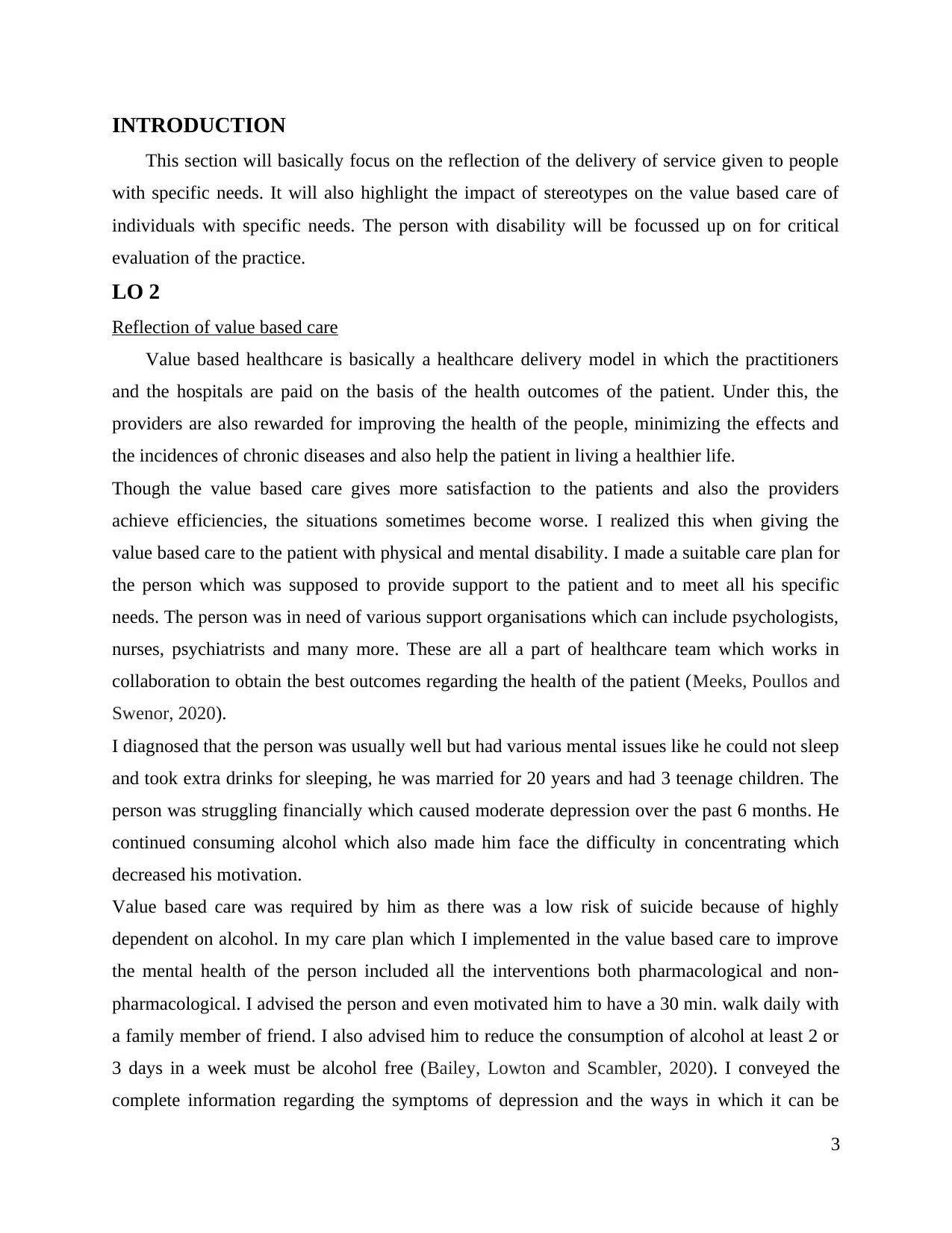
INTRODUCTION
This section will basically focus on the reflection of the delivery of service given to people
with specific needs. It will also highlight the impact of stereotypes on the value based care of
individuals with specific needs. The person with disability will be focussed up on for critical
evaluation of the practice.
LO 2
Reflection of value based care
Value based healthcare is basically a healthcare delivery model in which the practitioners
and the hospitals are paid on the basis of the health outcomes of the patient. Under this, the
providers are also rewarded for improving the health of the people, minimizing the effects and
the incidences of chronic diseases and also help the patient in living a healthier life.
Though the value based care gives more satisfaction to the patients and also the providers
achieve efficiencies, the situations sometimes become worse. I realized this when giving the
value based care to the patient with physical and mental disability. I made a suitable care plan for
the person which was supposed to provide support to the patient and to meet all his specific
needs. The person was in need of various support organisations which can include psychologists,
nurses, psychiatrists and many more. These are all a part of healthcare team which works in
collaboration to obtain the best outcomes regarding the health of the patient (Meeks, Poullos and
Swenor, 2020).
I diagnosed that the person was usually well but had various mental issues like he could not sleep
and took extra drinks for sleeping, he was married for 20 years and had 3 teenage children. The
person was struggling financially which caused moderate depression over the past 6 months. He
continued consuming alcohol which also made him face the difficulty in concentrating which
decreased his motivation.
Value based care was required by him as there was a low risk of suicide because of highly
dependent on alcohol. In my care plan which I implemented in the value based care to improve
the mental health of the person included all the interventions both pharmacological and non-
pharmacological. I advised the person and even motivated him to have a 30 min. walk daily with
a family member of friend. I also advised him to reduce the consumption of alcohol at least 2 or
3 days in a week must be alcohol free (Bailey, Lowton and Scambler, 2020). I conveyed the
complete information regarding the symptoms of depression and the ways in which it can be
3
This section will basically focus on the reflection of the delivery of service given to people
with specific needs. It will also highlight the impact of stereotypes on the value based care of
individuals with specific needs. The person with disability will be focussed up on for critical
evaluation of the practice.
LO 2
Reflection of value based care
Value based healthcare is basically a healthcare delivery model in which the practitioners
and the hospitals are paid on the basis of the health outcomes of the patient. Under this, the
providers are also rewarded for improving the health of the people, minimizing the effects and
the incidences of chronic diseases and also help the patient in living a healthier life.
Though the value based care gives more satisfaction to the patients and also the providers
achieve efficiencies, the situations sometimes become worse. I realized this when giving the
value based care to the patient with physical and mental disability. I made a suitable care plan for
the person which was supposed to provide support to the patient and to meet all his specific
needs. The person was in need of various support organisations which can include psychologists,
nurses, psychiatrists and many more. These are all a part of healthcare team which works in
collaboration to obtain the best outcomes regarding the health of the patient (Meeks, Poullos and
Swenor, 2020).
I diagnosed that the person was usually well but had various mental issues like he could not sleep
and took extra drinks for sleeping, he was married for 20 years and had 3 teenage children. The
person was struggling financially which caused moderate depression over the past 6 months. He
continued consuming alcohol which also made him face the difficulty in concentrating which
decreased his motivation.
Value based care was required by him as there was a low risk of suicide because of highly
dependent on alcohol. In my care plan which I implemented in the value based care to improve
the mental health of the person included all the interventions both pharmacological and non-
pharmacological. I advised the person and even motivated him to have a 30 min. walk daily with
a family member of friend. I also advised him to reduce the consumption of alcohol at least 2 or
3 days in a week must be alcohol free (Bailey, Lowton and Scambler, 2020). I conveyed the
complete information regarding the symptoms of depression and the ways in which it can be
3
⊘ This is a preview!⊘
Do you want full access?
Subscribe today to unlock all pages.

Trusted by 1+ million students worldwide
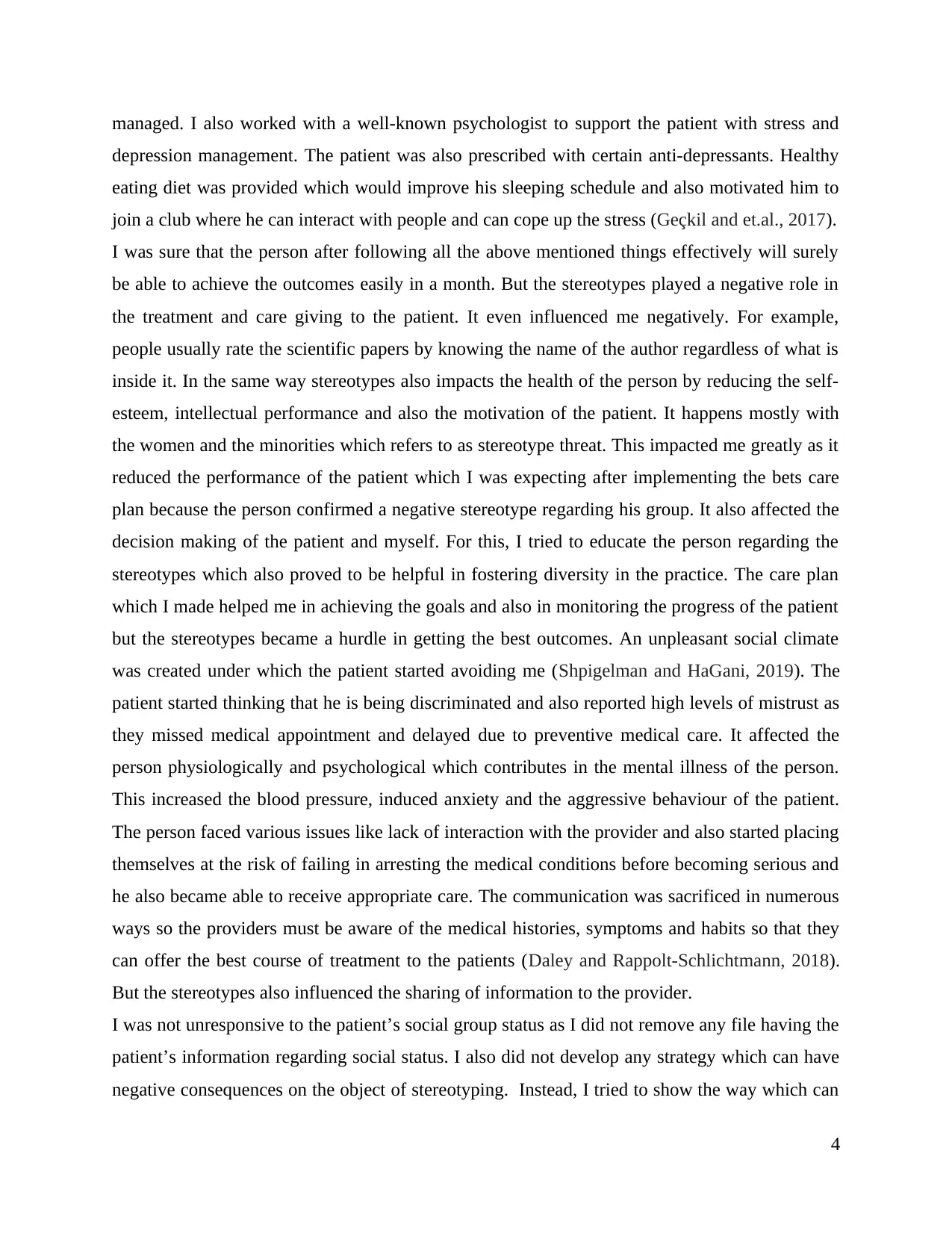
managed. I also worked with a well-known psychologist to support the patient with stress and
depression management. The patient was also prescribed with certain anti-depressants. Healthy
eating diet was provided which would improve his sleeping schedule and also motivated him to
join a club where he can interact with people and can cope up the stress (Geçkil and et.al., 2017).
I was sure that the person after following all the above mentioned things effectively will surely
be able to achieve the outcomes easily in a month. But the stereotypes played a negative role in
the treatment and care giving to the patient. It even influenced me negatively. For example,
people usually rate the scientific papers by knowing the name of the author regardless of what is
inside it. In the same way stereotypes also impacts the health of the person by reducing the self-
esteem, intellectual performance and also the motivation of the patient. It happens mostly with
the women and the minorities which refers to as stereotype threat. This impacted me greatly as it
reduced the performance of the patient which I was expecting after implementing the bets care
plan because the person confirmed a negative stereotype regarding his group. It also affected the
decision making of the patient and myself. For this, I tried to educate the person regarding the
stereotypes which also proved to be helpful in fostering diversity in the practice. The care plan
which I made helped me in achieving the goals and also in monitoring the progress of the patient
but the stereotypes became a hurdle in getting the best outcomes. An unpleasant social climate
was created under which the patient started avoiding me (Shpigelman and HaGani, 2019). The
patient started thinking that he is being discriminated and also reported high levels of mistrust as
they missed medical appointment and delayed due to preventive medical care. It affected the
person physiologically and psychological which contributes in the mental illness of the person.
This increased the blood pressure, induced anxiety and the aggressive behaviour of the patient.
The person faced various issues like lack of interaction with the provider and also started placing
themselves at the risk of failing in arresting the medical conditions before becoming serious and
he also became able to receive appropriate care. The communication was sacrificed in numerous
ways so the providers must be aware of the medical histories, symptoms and habits so that they
can offer the best course of treatment to the patients (Daley and Rappolt-Schlichtmann, 2018).
But the stereotypes also influenced the sharing of information to the provider.
I was not unresponsive to the patient’s social group status as I did not remove any file having the
patient’s information regarding social status. I also did not develop any strategy which can have
negative consequences on the object of stereotyping. Instead, I tried to show the way which can
4
depression management. The patient was also prescribed with certain anti-depressants. Healthy
eating diet was provided which would improve his sleeping schedule and also motivated him to
join a club where he can interact with people and can cope up the stress (Geçkil and et.al., 2017).
I was sure that the person after following all the above mentioned things effectively will surely
be able to achieve the outcomes easily in a month. But the stereotypes played a negative role in
the treatment and care giving to the patient. It even influenced me negatively. For example,
people usually rate the scientific papers by knowing the name of the author regardless of what is
inside it. In the same way stereotypes also impacts the health of the person by reducing the self-
esteem, intellectual performance and also the motivation of the patient. It happens mostly with
the women and the minorities which refers to as stereotype threat. This impacted me greatly as it
reduced the performance of the patient which I was expecting after implementing the bets care
plan because the person confirmed a negative stereotype regarding his group. It also affected the
decision making of the patient and myself. For this, I tried to educate the person regarding the
stereotypes which also proved to be helpful in fostering diversity in the practice. The care plan
which I made helped me in achieving the goals and also in monitoring the progress of the patient
but the stereotypes became a hurdle in getting the best outcomes. An unpleasant social climate
was created under which the patient started avoiding me (Shpigelman and HaGani, 2019). The
patient started thinking that he is being discriminated and also reported high levels of mistrust as
they missed medical appointment and delayed due to preventive medical care. It affected the
person physiologically and psychological which contributes in the mental illness of the person.
This increased the blood pressure, induced anxiety and the aggressive behaviour of the patient.
The person faced various issues like lack of interaction with the provider and also started placing
themselves at the risk of failing in arresting the medical conditions before becoming serious and
he also became able to receive appropriate care. The communication was sacrificed in numerous
ways so the providers must be aware of the medical histories, symptoms and habits so that they
can offer the best course of treatment to the patients (Daley and Rappolt-Schlichtmann, 2018).
But the stereotypes also influenced the sharing of information to the provider.
I was not unresponsive to the patient’s social group status as I did not remove any file having the
patient’s information regarding social status. I also did not develop any strategy which can have
negative consequences on the object of stereotyping. Instead, I tried to show the way which can
4
Paraphrase This Document
Need a fresh take? Get an instant paraphrase of this document with our AI Paraphraser
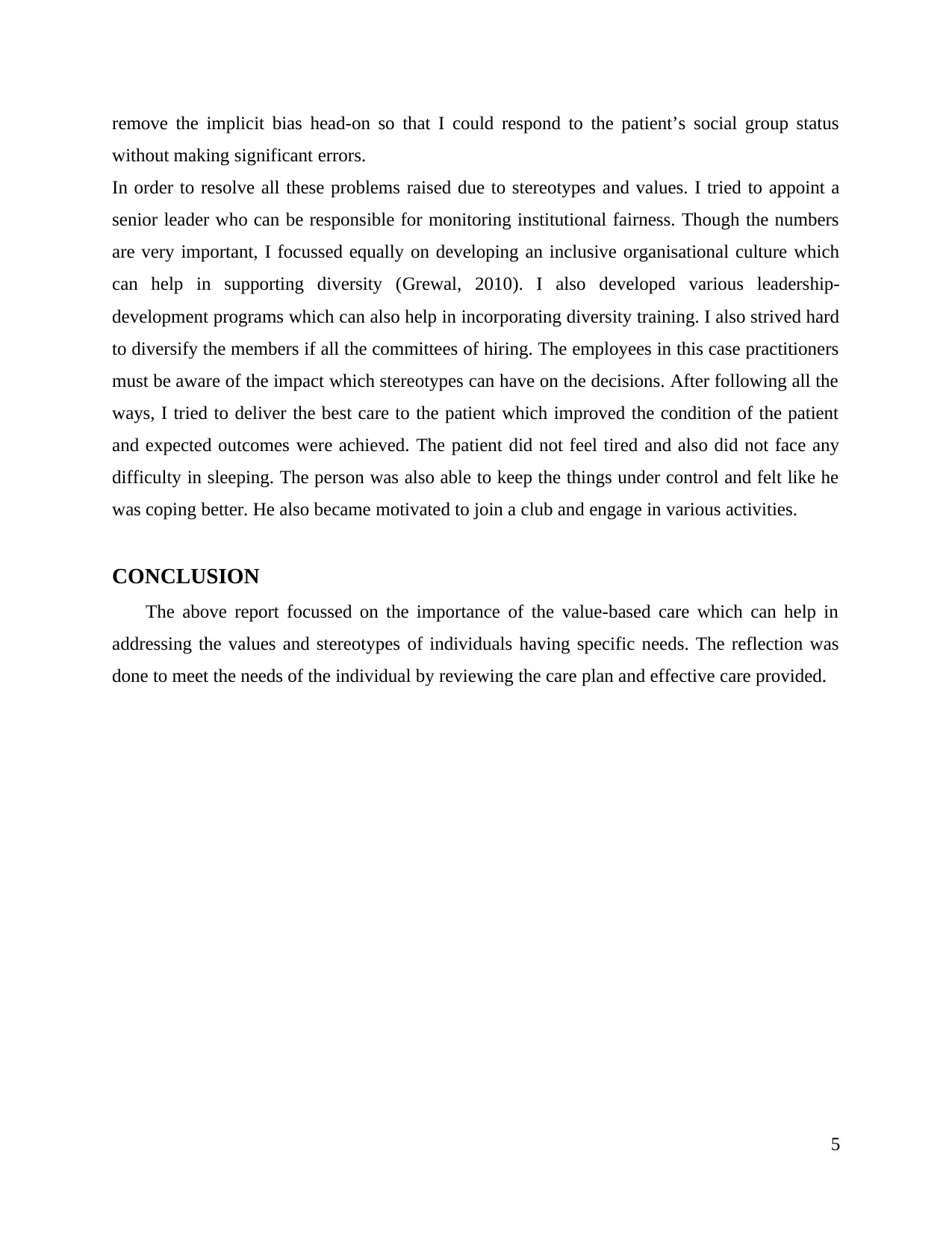
remove the implicit bias head-on so that I could respond to the patient’s social group status
without making significant errors.
In order to resolve all these problems raised due to stereotypes and values. I tried to appoint a
senior leader who can be responsible for monitoring institutional fairness. Though the numbers
are very important, I focussed equally on developing an inclusive organisational culture which
can help in supporting diversity (Grewal, 2010). I also developed various leadership-
development programs which can also help in incorporating diversity training. I also strived hard
to diversify the members if all the committees of hiring. The employees in this case practitioners
must be aware of the impact which stereotypes can have on the decisions. After following all the
ways, I tried to deliver the best care to the patient which improved the condition of the patient
and expected outcomes were achieved. The patient did not feel tired and also did not face any
difficulty in sleeping. The person was also able to keep the things under control and felt like he
was coping better. He also became motivated to join a club and engage in various activities.
CONCLUSION
The above report focussed on the importance of the value-based care which can help in
addressing the values and stereotypes of individuals having specific needs. The reflection was
done to meet the needs of the individual by reviewing the care plan and effective care provided.
5
without making significant errors.
In order to resolve all these problems raised due to stereotypes and values. I tried to appoint a
senior leader who can be responsible for monitoring institutional fairness. Though the numbers
are very important, I focussed equally on developing an inclusive organisational culture which
can help in supporting diversity (Grewal, 2010). I also developed various leadership-
development programs which can also help in incorporating diversity training. I also strived hard
to diversify the members if all the committees of hiring. The employees in this case practitioners
must be aware of the impact which stereotypes can have on the decisions. After following all the
ways, I tried to deliver the best care to the patient which improved the condition of the patient
and expected outcomes were achieved. The patient did not feel tired and also did not face any
difficulty in sleeping. The person was also able to keep the things under control and felt like he
was coping better. He also became motivated to join a club and engage in various activities.
CONCLUSION
The above report focussed on the importance of the value-based care which can help in
addressing the values and stereotypes of individuals having specific needs. The reflection was
done to meet the needs of the individual by reviewing the care plan and effective care provided.
5
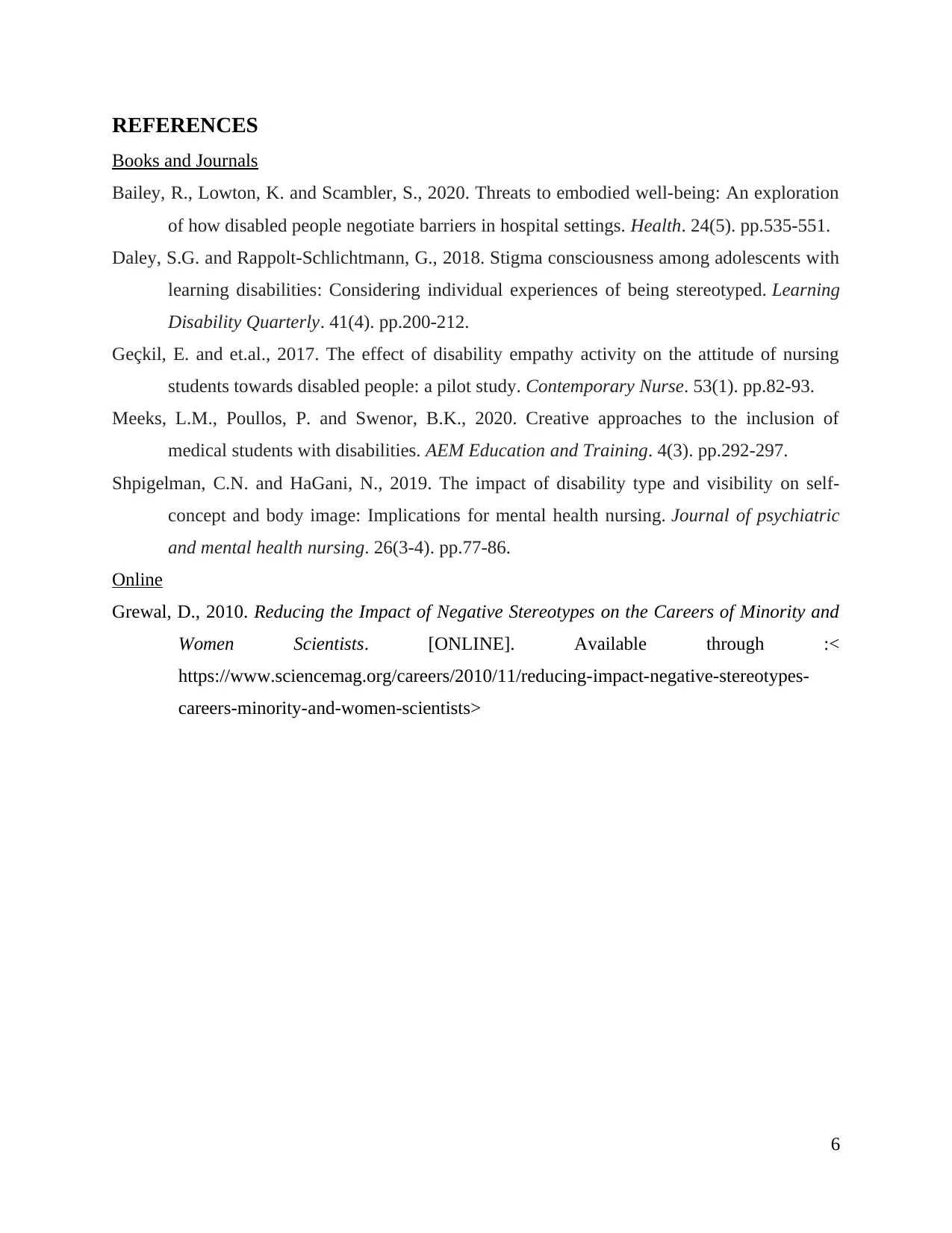
REFERENCES
Books and Journals
Bailey, R., Lowton, K. and Scambler, S., 2020. Threats to embodied well-being: An exploration
of how disabled people negotiate barriers in hospital settings. Health. 24(5). pp.535-551.
Daley, S.G. and Rappolt-Schlichtmann, G., 2018. Stigma consciousness among adolescents with
learning disabilities: Considering individual experiences of being stereotyped. Learning
Disability Quarterly. 41(4). pp.200-212.
Geçkil, E. and et.al., 2017. The effect of disability empathy activity on the attitude of nursing
students towards disabled people: a pilot study. Contemporary Nurse. 53(1). pp.82-93.
Meeks, L.M., Poullos, P. and Swenor, B.K., 2020. Creative approaches to the inclusion of
medical students with disabilities. AEM Education and Training. 4(3). pp.292-297.
Shpigelman, C.N. and HaGani, N., 2019. The impact of disability type and visibility on self‐
concept and body image: Implications for mental health nursing. Journal of psychiatric
and mental health nursing. 26(3-4). pp.77-86.
Online
Grewal, D., 2010. Reducing the Impact of Negative Stereotypes on the Careers of Minority and
Women Scientists. [ONLINE]. Available through :<
https://www.sciencemag.org/careers/2010/11/reducing-impact-negative-stereotypes-
careers-minority-and-women-scientists>
6
Books and Journals
Bailey, R., Lowton, K. and Scambler, S., 2020. Threats to embodied well-being: An exploration
of how disabled people negotiate barriers in hospital settings. Health. 24(5). pp.535-551.
Daley, S.G. and Rappolt-Schlichtmann, G., 2018. Stigma consciousness among adolescents with
learning disabilities: Considering individual experiences of being stereotyped. Learning
Disability Quarterly. 41(4). pp.200-212.
Geçkil, E. and et.al., 2017. The effect of disability empathy activity on the attitude of nursing
students towards disabled people: a pilot study. Contemporary Nurse. 53(1). pp.82-93.
Meeks, L.M., Poullos, P. and Swenor, B.K., 2020. Creative approaches to the inclusion of
medical students with disabilities. AEM Education and Training. 4(3). pp.292-297.
Shpigelman, C.N. and HaGani, N., 2019. The impact of disability type and visibility on self‐
concept and body image: Implications for mental health nursing. Journal of psychiatric
and mental health nursing. 26(3-4). pp.77-86.
Online
Grewal, D., 2010. Reducing the Impact of Negative Stereotypes on the Careers of Minority and
Women Scientists. [ONLINE]. Available through :<
https://www.sciencemag.org/careers/2010/11/reducing-impact-negative-stereotypes-
careers-minority-and-women-scientists>
6
⊘ This is a preview!⊘
Do you want full access?
Subscribe today to unlock all pages.

Trusted by 1+ million students worldwide

7
1 out of 7
Related Documents
Your All-in-One AI-Powered Toolkit for Academic Success.
+13062052269
info@desklib.com
Available 24*7 on WhatsApp / Email
![[object Object]](/_next/static/media/star-bottom.7253800d.svg)
Unlock your academic potential
Copyright © 2020–2026 A2Z Services. All Rights Reserved. Developed and managed by ZUCOL.





